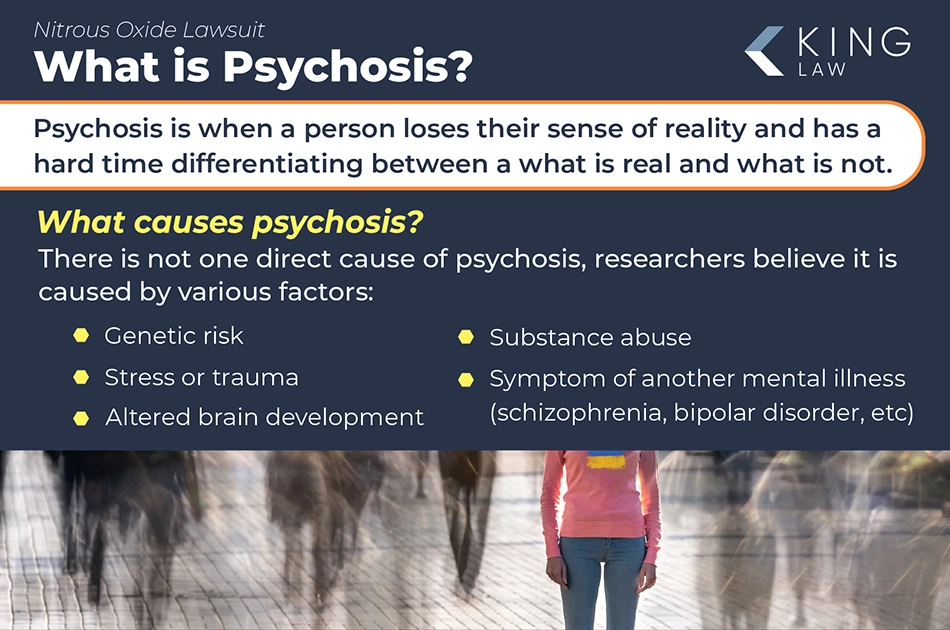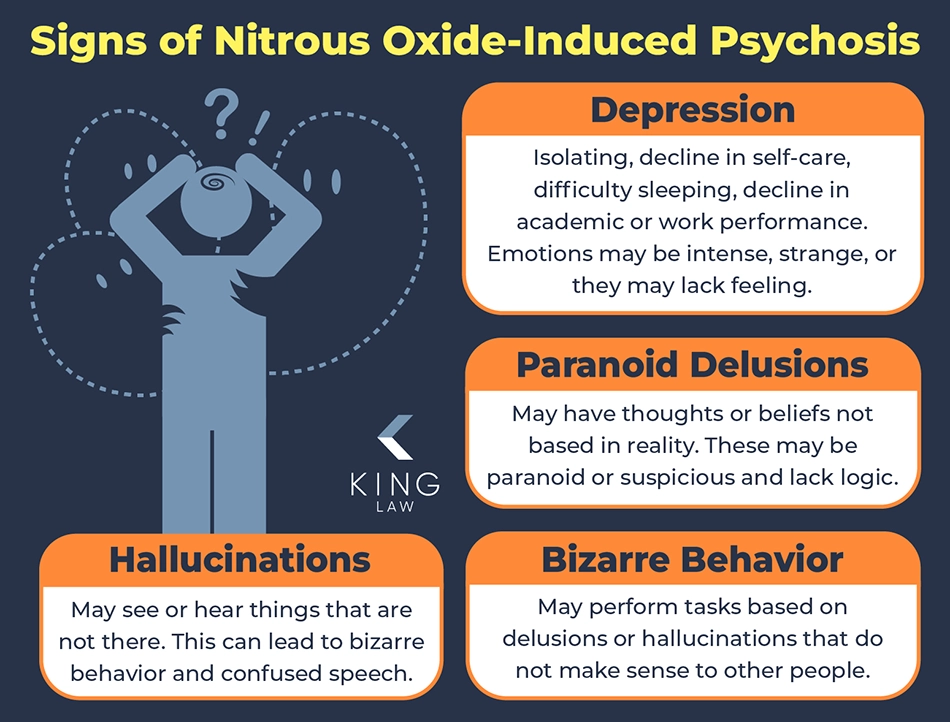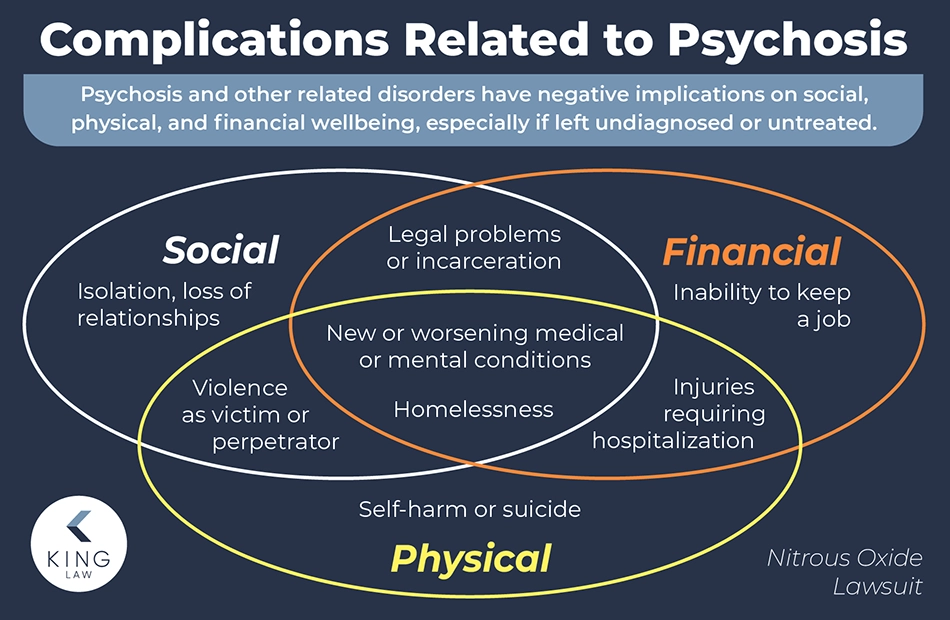Complete the form below to see if you qualify for a Whip-It Lawsuit

Nitrous oxide can cause psychosis and abuse rates are on the rise with a growing number of people experiencing mental disturbances after huffing the gas. Psychosis is a severe mental health condition where someone may hallucinate, lose touch with reality, become paranoid, and believe good or bad things that are not true. Many people are unaware that nitrous oxide can impact their mental health in this way because they see nitrous oxide as generally safe and easily attainable.
In this article, we explore how nitrous oxide can cause psychosis, what the symptoms of psychosis are, and how the condition can affect someone in the long term. We will also discuss the rates of nitrous oxide abuse and nitrous oxide-induced psychosis, and how to treat this condition. Finally, we explain how you can seek compensation by filing a lawsuit if you or your loved one experienced psychosis after taking nitrous oxide.
About Nitrous Oxide and Psychosis:
What Is Nitrous Oxide-Induced Psychosis?
Can Nitrous Oxide Cause Psychosis?
How Does Nitrous Oxide Cause Psychosis?
Signs and Symptoms of Nitrous Oxide-Induced Psychosis
Long-Term Psychosis From Nitrous Oxide
Nitrous Oxide Abuse and Psychosis Statistics
Nitrous Oxide Psychosis Treatment Options
King Law Is Accepting Psychosis Claims From Nitrous Oxide Abuse
What Is Nitrous Oxide-Induced Psychosis?
Nitrous oxide (also known as N2O, NOS, Galaxy Gas, whippets, and nangs) is becoming a drug of choice for many teenagers, adolescents, and young adults. Huffing nitrous oxide causes brief euphoria, making it popular at parties, festivals, and clubs. However, if people use large amounts of nitrous or use the drug frequently, they can experience nitrous oxide-induced psychosis.
Nitrous oxide companies are making whippits, cans, and canisters that are being sold online and in smoke, vape, and head shops across the country. In many states, people can buy these products with few restrictions. Nitrous oxide has become increasingly popular over the last 10 years. With its rise in popularity, more people are experiencing psychosis after abusing N2O.
Nitrous oxide-induced psychosis can occur even if the person does not have an existing mental health problem. Psychosis (also called psychotic disorder) is when someone cannot tell what is real. A psychotic episode can last anywhere from days to weeks to months. Psychosis is a serious mental health condition that can get better with treatment. However, it can completely uproot someone’s life and even be life-threatening.

Can Nitrous Oxide Cause Psychosis?
Yes. Nitrous oxide can cause psychosis, especially in people who are overdosing on N2O or using it long term.. Nitrous oxide is a colorless, odorless gas that makes you feel disconnected from your brain, body, and the world. Part of this is because it cuts off the oxygen supply to your brain, so it impacts how you think, feel, and act. Using large amounts of nitrous oxide or using it every day can increase its impact on your brain.
Lots of people who use nitrous oxide can experience the following mental health symptoms:
- Seeing things or hearing voices that other people cannot
- Thinking that facts or events are real when they are not
- Suddenly feeling suspicious of people you usually trust
- Feeling like the world is out to get you
- Not being able to organize your thoughts
- Serious and unwanted changes to your personality
- Symptoms of schizophrenia
These side effects can happen to anyone, not just people who have a history of mental health challenges or who are low on vitamin B-12 because of nitrous oxide use. People who experience these psychological changes may feel better if they stop using N2O. However, they would also need to get treatment from their medical and mental health teams.
How Does Nitrous Oxide Cause Psychosis?
There are a couple of different ways that nitrous oxide can cause psychosis. One is because nitrous oxide prevents your body from properly using vitamin B-12. Vitamin B-12 is an important nutrient for your cells to keep your brain working properly and to send and receive cues to your muscles. When you do not have enough available vitamin B-12, your brain cells cannot talk to each other, so it can make it harder for you to think straight, manage your moods, and stay focused.
Nitrous oxide can also make it harder for your body to make and use dopamine (the hormone that makes you feel happy) and NMDA (which helps with memory and learning). Without enough of these chemicals, you may experience negative mental health symptoms and psychosis. Over time, these changes can become more severe and may not go away after you stop using N2O. Instead, you may need intense vitamin B-12 treatments and therapy to help your physical and mental health.
Signs and Symptoms of Nitrous Oxide-Induced Psychosis
You may experience psychosis symptoms after using nitrous oxide for the first time, after using a high dose, or after you have been using it every day. Psychosis symptoms may show up all at once, or they can gradually get worse over time until they reach a peak or crisis level. Psychosis affects everyone differently, but it usually involves feeling paranoid, being unable to stop thinking about or doing the same thing over and over, hallucinating, or not being able to control or organize your thoughts.
Paranoid Delusions From Nitrous Oxide
One of the symptoms of psychosis from nitrous oxide is having uncontrollable paranoid thoughts that are not based on reality. For example, one man thought the police had implanted a chip in his arm and was using the device to control his thoughts. He also thought his neighbors were constantly watching him and that the police had planted video cameras in his house. These paranoid delusions may get better after the person stops huffing nitrous oxide and gets treatment (like vitamin B-12 doses and therapy).
Auditory and Visual Hallucinations
Nitrous oxide-induced psychosis can also make the person see and hear things that are not really there. For example, one 20-year-old woman thought that someone had put a device in her throat and that they were using it to control her body and give her orders. She told her doctors that the device would talk to her, and it was telling her to end her life. For some people, these hallucinations may get better right after they stop using nitrous oxide. For other people, however, it may take intensive treatments and a long time away from nitrous oxide to see improvement.
Weird and Bizarre Behavior
Nitrous oxide can trigger psychosis that makes people believe in things and act in ways that are not normal or healthy. Oftentimes, psychosis makes people believe things that are not true, and it can make them act in ways that may not make sense to other people. They may talk to themselves or be passionate about beliefs that are not based on reality or facts.
For example, one woman started keeping her clothes on when she showered, because she thought someone had put cameras in her bathroom. She would also laugh loudly at inappropriate times, could not fill out forms anymore, and was convinced that the voices wanted her to “tear out her fingernails and fly.”
Nitrous Oxide and Depression
Another symptom of nitrous oxide-induced psychosis is depression. Nitrous oxide can keep you from making and using dopamine and other hormones that your body needs to regulate its emotions. As a result, you may feel depressed, withdraw from people you love, or want to end your own life.
For example, a young woman who became addicted to nitrous oxide after using it at a friend’s party experienced significant changes in her thinking and behavior. She stopped seeing her family, and she believed that she had a chip in her brain that was controlling her and talking to her. She also had trouble recognizing her family members and struggled with depression because of nitrous oxide use.

Long-Term Psychosis From Nitrous Oxide
Sometimes, the psychosis symptoms caused by nitrous oxide use can be temporary. If that is the case, the symptoms may go away completely or or get better after the person stops using nitrous oxide and gets treatment. However, for other people, psychosis symptoms may last for a long time, or the person may never feel or act as they did before they started huffing nitrous oxide.
It is important for people to see a doctor and get help right away if they are using nitrous and notice changes in how they think, perceive the world, feel, or act. Getting treatment early on can lessen the risk that the person will experience severe and long-term changes that keep them from living a normal life.
If the person continues to huff nitrous oxide every day and does not get help (such as Vitamin B-12 treatments) for their psychosis, the condition may get worse and have long-term impacts. Some people with nitrous-oxide-induced psychosis may have symptoms similar to schizophrenia or a significant mood disorder like bipolar disorder. It can make it harder for them to make and keep friendships and romantic relationships, as well as interact with the world around them in healthy ways.

Nitrous Oxide Abuse and Psychosis Statistics
Researchers and medical professionals are tracking nitrous oxide abuse rates and how often nitrous oxide misuse leads to psychosis. So far, the results show a concerning trend. In 2016, researchers looked at 91 documented cases of people misusing nitrous oxide. According to their review, 11 of the patients (12%) developed psychosis. The patients experienced troubling hallucinations and beliefs that made it hard for them to live their lives and maintain friendships.
In the 2016 study, the researchers noted that nitrous oxide misuse and the psychological problems it can cause are hard to study because they may not be reported. This is a common concern among medical professionals. Some believe it may be underreported because the high that patients get does not last long, and medical centers cannot always screen for this type of drug abuse. The nitrous oxide does not stay in the person’s system long enough to be detected in blood or urine tests.
Nitrous oxide misuse is on the rise internationally. In 2020, nitrous oxide was the second most popular recreational drug for 16 to 24-year-olds in England and Wales. In the United States, over 13 million people over 12 have used nitrous oxide for fun or to get high. The United Kingdom indicated that there were 11 percent more reports of nitrous oxide abuse in 2017 (31 percent of all self-reports) than in 2014 (20 percent). People who reported having nitrous oxide abuse struggles said they experienced a range of side effects, including trouble with maintaining a connection with reality.
Nitrous Oxide Psychosis Treatment Options
If you or a family member is experiencing psychosis because of your nitrous oxide misuse, there are steps you can take to help with treatment. The first is to stop using nitrous oxide recreationally. Even occasional or low-dose use of nitrous oxide can have serious effects on your brain and body, especially if you are already experiencing symptoms. You should also see a doctor, who can recommend treatments to reduce your psychiatric symptoms and help you recover from your addiction.
One of the treatments for psychosis from nitrous oxide is injections or supplements of vitamin B-12, which you may be low on because of how N2O impacts your body. You may have to receive these daily or weekly until your medical team says your levels are back to where they should be. Your provider may also give you medications to stabilize your mood, help you sleep, and make it easier for you to think clearly and control your thoughts. If you have severe symptoms of psychosis, your doctor may recommend that you go to an inpatient or outpatient mental health program so you have the ongoing support you need to get back on track.
King Law Is Accepting Psychosis Claims From Nitrous Oxide Abuse
According to lawsuits being filed across the country, nitrous oxide companies have been marketing their whipped cream chargers to appeal to the young, carefree party scene. Many people think these companies have not been honest about how N2O can impact people’s physical and mental health. They are demanding compensation for their immense losses, including the physical and emotional cost of having drug-induced psychosis.
Our law firm is investigating claims from people who developed psychosis after using nitrous oxide made by Galaxy Gas, Whip-It!, and other companies. You do not have to have a history of mental health struggles to qualify for compensation if you suffer from nitrous oxide-induced psychosis. We can evaluate your case and recommend legal options to seek justice from the companies that misled you and sold you the product that uprooted your life.
Contact a Nitrous Oxide and Psychosis Lawyer Today
If you experienced psychosis after using nitrous oxide, King Law can help you file a nitrous oxide claim. Additionally, if you lost a loved one to suicide or other complications caused by nitrous oxide-induced psychosis, you may be able to file a wrongful death claim. Call (585) 496-2648 for a free consultation. We provide free case reviews, and you do not have to pay us any money upfront to hire us. You only pay us if we help you win compensation for your injuries.

